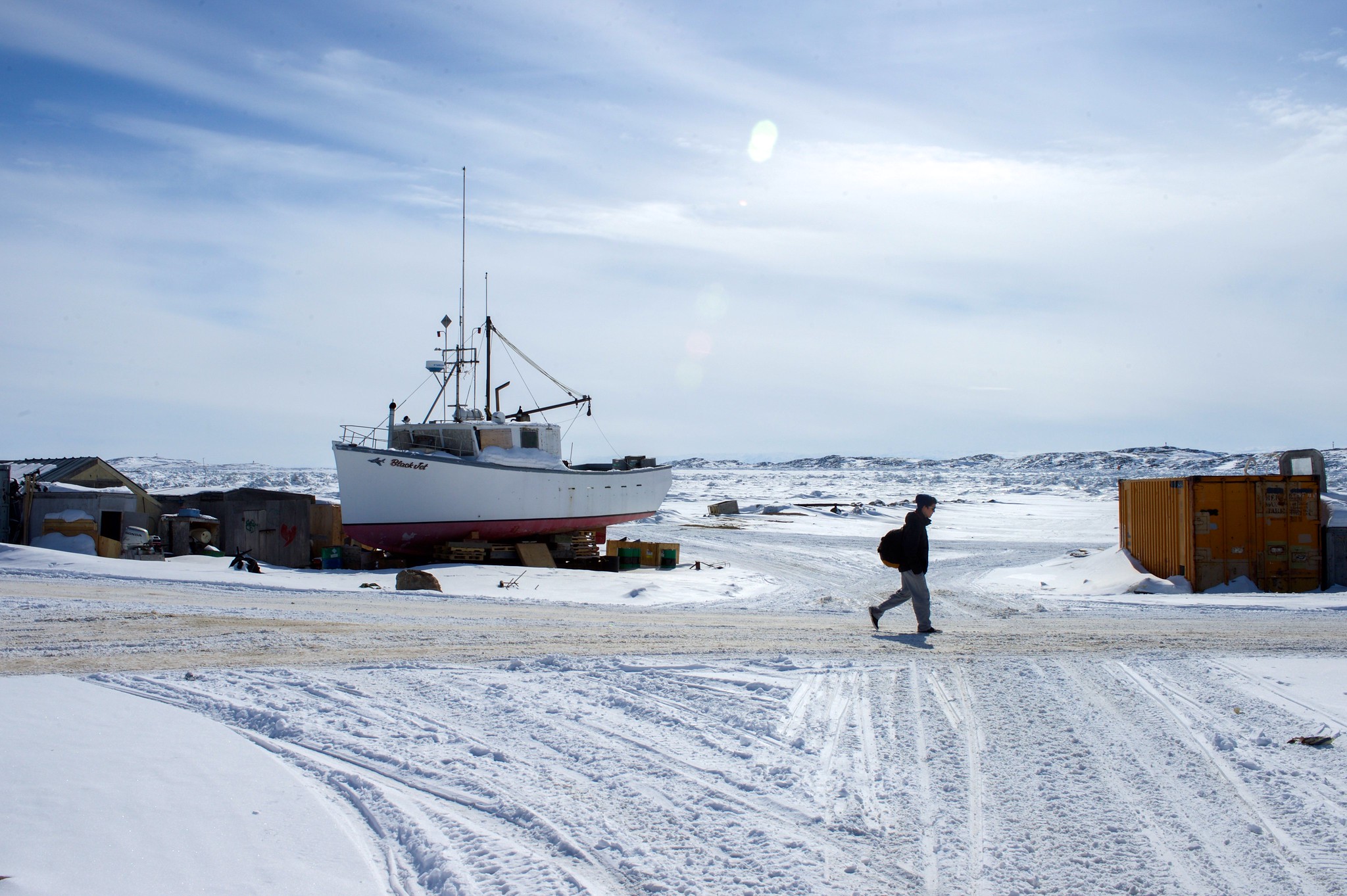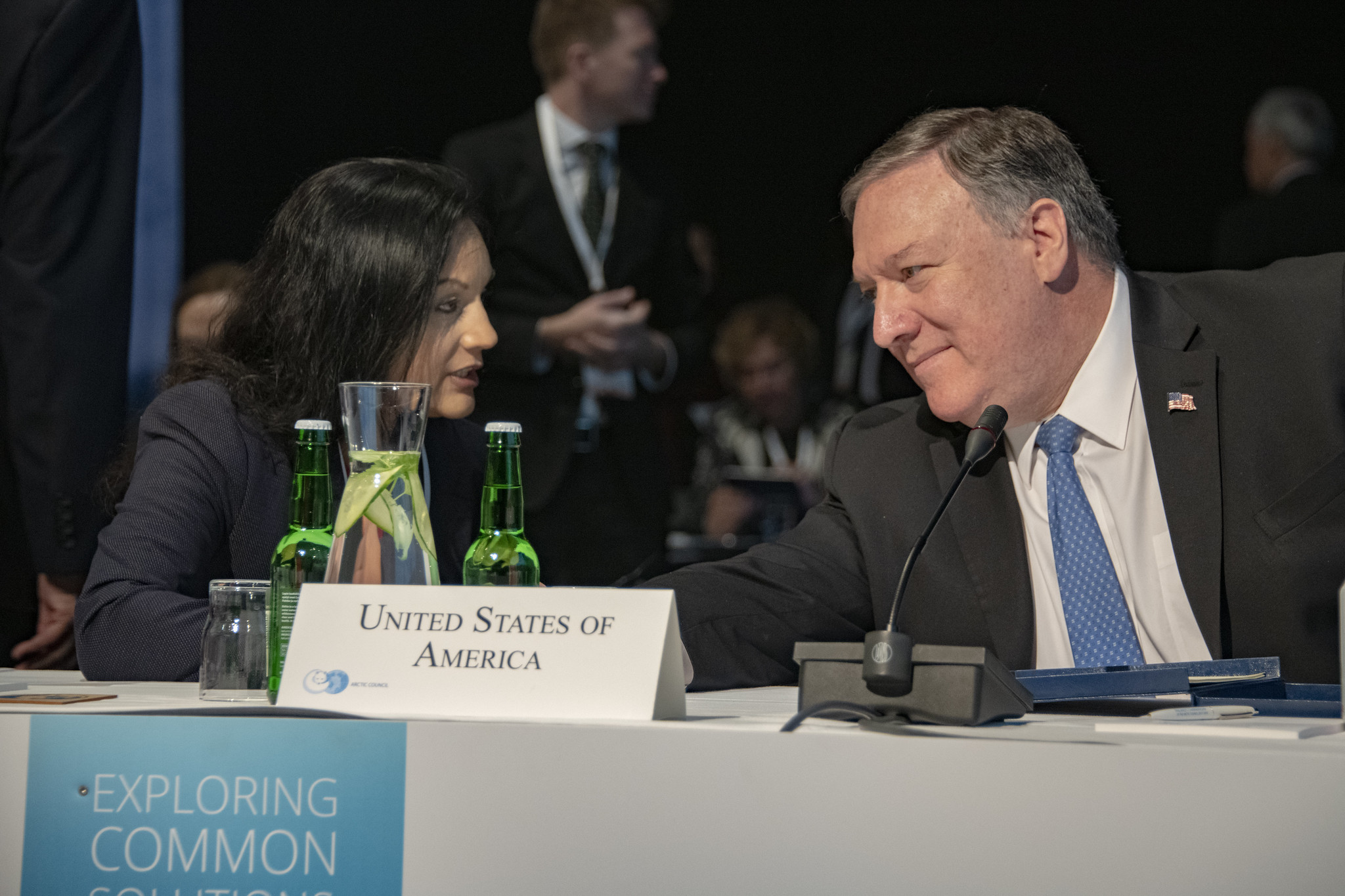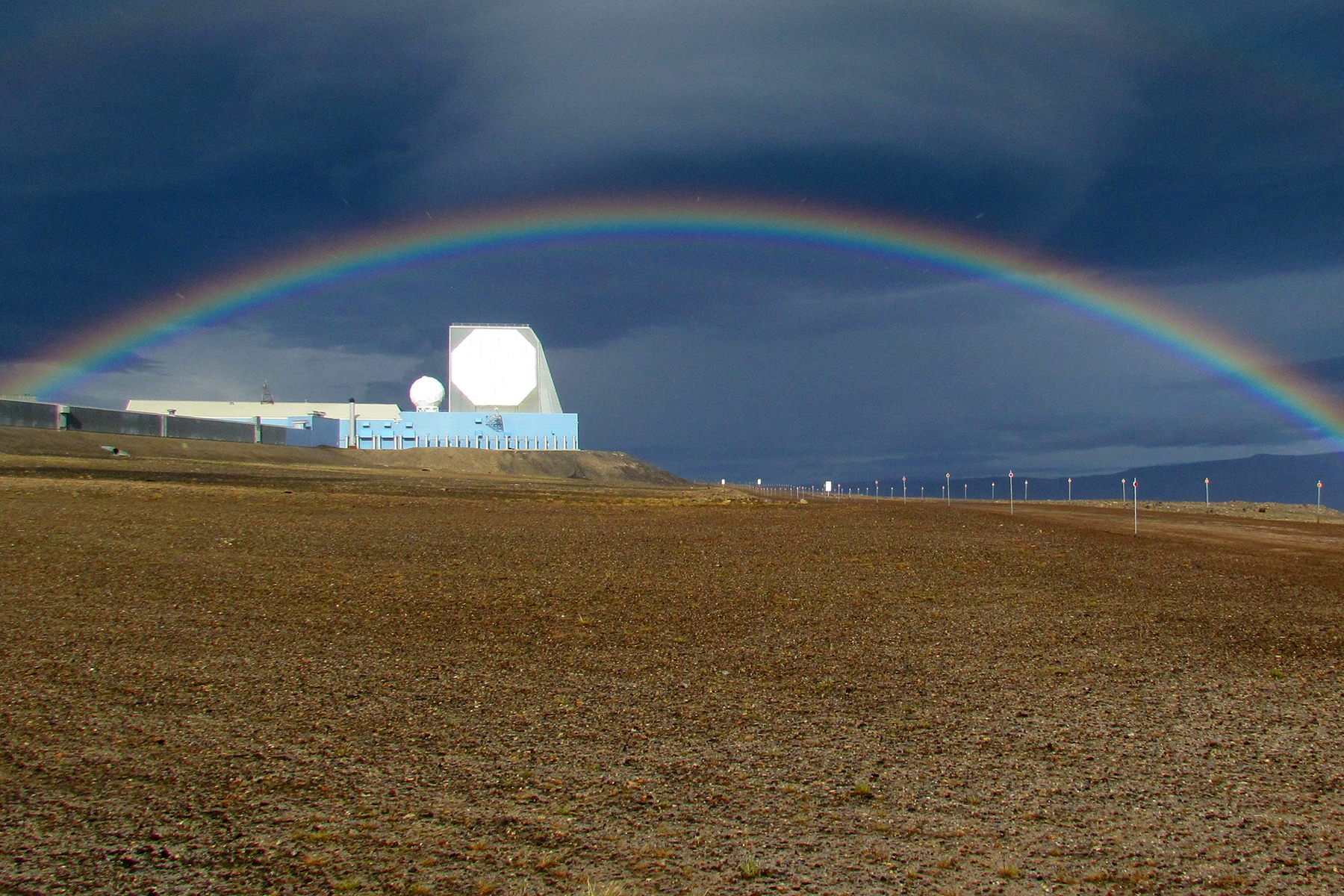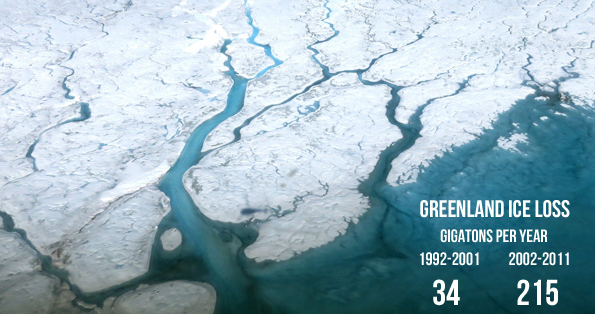Michael T. Klare examines the U.S. secretary of state’s grim and historic proclamation on the Far North.

Iqaluit, Canada, just below the Arctic Circle, April 2015. (State Department)
By Michael T. Klare
TomDispatch.com
 Donald Trump got the headlines as usual — but don’t be fooled. It wasn’t Trumpism in action this August, but what we should all now start referring to as the Pompeo Doctrine. When it comes to the Arctic region, the secretary of state has a lot more than buying Greenland on his mind.
Donald Trump got the headlines as usual — but don’t be fooled. It wasn’t Trumpism in action this August, but what we should all now start referring to as the Pompeo Doctrine. When it comes to the Arctic region, the secretary of state has a lot more than buying Greenland on his mind.
In mid-August, as no one is likely to forget, President Trump surprised international observers by expressing an interest in purchasing Greenland, a semi-autonomous region of Denmark. Most commentators viewed the move as just another example of the president’s increasingly erratic behavior. Danish Prime Minister Mette Frederiksen termed the very notion of such a deal “absurd,” leading Trump, in an outburst of pique, to call her comments “nasty” and cancel a long-scheduled state visit to Copenhagen.
A deeper look at that incident and related administration moves, however, suggests quite a different interpretation of what’s going on, with immense significance for the planet and even human civilization. Under the prodding of Mike Pompeo, the White House increasingly views the Arctic as a key arena for future great-power competition, with the ultimate prize being an extraordinary trove of valuable resources, including oil, natural gas, uranium, zinc, iron ore, gold, diamonds, and rare earth minerals. Add in one more factor: though no one in the administration is likely to mention the forbidden term “climate change” or “climate crisis,” they all understand perfectly well that global warming is what’s making such a resource scramble possible.

Danish Prime Minister Mette Frederiksen, June 2019. (News Oresund, CC BY 2.0, Wikimedia Commons)
This isn’t the first time that great powers have paid attention to the Arctic. That region enjoyed some strategic significance during the Cold War period, when both the United States and the Soviet Union planned to use its skies as passageways for nuclear-armed missiles and bombers dispatched to hit targets on the other side of the globe. Since the end of that era, however, it has largely been neglected. Frigid temperatures, frequent storms, and waters packed with ice prevented most normal air and maritime travel, so — aside from the few Indigenous peoples who had long adapted to such conditions — who would want to venture there?
Climate change is, however, already altering the situation in drastic ways: temperatures are rising faster in the Arctic than anywhere else on the planet, melting parts of the polar ice cap and exposing once-inaccessible waters and islands to commercial development. Oil and natural gas reserves have been discovered in offshore areas previously (but no longer) covered by sea ice most of the year. Meanwhile, new mining opportunities are emerging in, yes, Greenland. Worried that other countries, including China and Russia, might reap the benefits of such a climate-altered landscape, the Trump administration has already launched an all-out drive to ensure American dominance there, at the risk of future confrontation and conflict.
The scramble for the Arctic’s resources was launched early in this century when the world’s major energy firms, led by BP, ExxonMobil, Shell, and Russian gas giant Gazprom, began exploring for oil and gas reserves in areas only recently made accessible by retreating sea ice. Those efforts gained momentum in 2008, after the U.S. Geological Survey published a report, Circum-Arctic Resources Appraisal, indicating that as much as one-third of the world’s undiscovered oil and gas lay in areas north of the Arctic Circle. Much of this untapped fossil fuel largess was said to lie beneath the Arctic waters adjoining Alaska (that is, the United States), Canada, Greenland (controlled by Denmark), Norway, and Russia — the so-called Arctic Five.
Under existing international law, codified in the U.N. Convention on the Law of the Sea (UNCLOS), coastal nations possess the right to exploit undersea resources up to 200 nautical miles from their shoreline (and beyond if their continental shelf extends farther than that). The Arctic Five have all laid claim to “exclusive economic zones” (EEZs) in those waters or, in the case of the United States (which has not ratified UNCLOS), announced its intention to do so. Most known oil and gas reserves are found within those EEZs, although some are thought to be in overlapping or even contested areas beyond that 200-mile limit, including the polar region itself. Whoever owns Greenland, of course, possesses the right to develop its EEZ.
For the most part, the Arctic Five have asserted their intent to settle any disputes arising from contested claims through peaceful means, the operating principle behind the formation in 1996 of the Arctic Council, an intergovernmental organization for states with territory above the Arctic Circle (including the Arctic Five, Finland, Iceland and Sweden). Meeting every two years, it provides a forum in which, at least theoretically, leaders of those countries and the Indigenous peoples living there can address common concerns and work towards cooperative solutions — and it had indeed helped dampen tensions in the region. In recent years, however, isolating the Arctic from mounting U.S. (and NATO) hostilities toward Russia and China or from the global struggle over vital resources has proven increasingly difficult. By May 2019, when Pompeo led an American delegation to the council’s most recent meeting in Rovaniemi, Finland, hostility and the urge to grab future resources had already spilled into the open.
Reaping the Arctic’s Riches

Leaders of the Arctic Council meet in Rovaniemi, Finland, May 6, 2019. (State Department/Ron Przysucha)
Usually a forum for anodyne statements about international cooperation and proper environmental stewardship, the lid was blown off the latest Arctic Council meeting in May when Pompeo delivered an unabashedly martial and provocative speech that deserves far more attention than it got at the time. So, let’s take a little tour of what may prove a historic proclamation (in the grimmest sense possible) of a new Washington doctrine for the Far North.
“In its first two decades, the Arctic Council has had the luxury of focusing almost exclusively on scientific collaboration, on cultural matters, on environmental research,” the secretary of state began mildly. These were, he said, “all important themes, very important, and we should continue to do those. But no longer do we have that luxury. We’re entering a new age of strategic engagement in the Arctic, complete with new threats to the Arctic and its real estate, and to all of our interests in that region.”
In what turned out to be an ultra-hardline address, Pompeo claimed that we were now in a new era in the Arctic. Because climate change — a phrase Pompeo, of course, never actually uttered — is now making it ever more possible to exploit the region’s vast resource riches, a scramble to gain control of them is now officially underway. That competition for resources has instantly become enmeshed in a growing geopolitical confrontation between the U.S., Russia and China, generating new risks of conflict.
On the matter of resource exploitation, Pompeo could hardly contain his enthusiasm. Referring to the derision that greeted William Seward’s purchase of Alaska in 1857, he declared:
“Far from the barren backcountry that many thought it to be in Seward’s time, the Arctic is at the forefront of opportunity and abundance. It houses 13 percent of the world’s undiscovered oil, 30 percent of its undiscovered gas, and an abundance of uranium, rare earth minerals, gold, diamonds, and millions of square miles of untapped resources.”
Of equal attraction, he noted, was the possibility of vastly increasing maritime commerce through newly de-iced trans-Arctic trade routes that will link the Euro-Atlantic region with Asia. “Steady reductions in sea ice are opening new passageways and new opportunities for trade,” he enthused. “This could potentially slash the time it takes to travel between Asia and the West by as much as 20 days … Arctic sea lanes could come [to be] the 21st century’s Suez and Panama Canals.” That such “steady reductions in sea ice” are the sole consequence of climate change went unmentioned, but so did another reality of our warming world. If the Arctic one day truly becomes the northern equivalent of a tropical passageway like the Suez or Panama canals, that will likely mean that parts of those southerly areas will have become the equivalents of uninhabitable deserts.
As such new trade and drilling opportunities arise, Pompeo affirmed, the United States intends to be out front in capitalizing on them. He then began bragging about what the Trump administration had already accomplished, including promoting expanded oil and gas drilling in offshore waters and also freeing up “energy exploration in the Arctic National Wildlife Refuge,” a pristine stretch of northern Alaska prized by environmentalists as a sanctuary for migrating caribou and other at-risk species. Additional efforts to exploit the region’s vital resources, he promised, are scheduled for the years ahead.

Acting Under Secretary of State for Economic Growth, Energy, and the Environment Manisha Singh, at left, with U.S. Secretary of State Michael R. Pompeo with with Arctic Council meeting in Rovaniemi, Finland, May 7, 2019. (State Department/Ron Przysucha)
A New Arena for Competition (and Worse)
Ideally, Pompeo noted placidly, competition for the Arctic’s resources will be conducted in an orderly, peaceful manner. The United States, he assured his listeners, believes in “free and fair competition, open, by the rule of law.” But other countries, he added ominously, especially China and Russia, won’t play by that rulebook much of the time and so must be subject to careful oversight and, if need be, punitive action.
China, he pointed out, is already developing trade routes in the Arctic, and establishing economic ties with key nations there. Unlike the United States (which already has multiple military bases in the Arctic, including one at Thule in Greenland, and so has a well-established presence there), Pompeo claimed that Beijing is surreptitiously using such supposedly economic activities for military purposes, including, heinously enough, spying on U.S. ballistic missile submarines operating in the region, while intimidating its local partners into acquiescence.
He then cited events in the distant South China Sea, where the Chinese have indeed militarized a number of tiny uninhabited islands (outfitting them with airstrips, missile batteries, and the like) and the U.S. has responded by sending its warships into adjacent waters. He did so to warn of similar future military stand-offs and potential clashes in the Arctic. “Let’s just ask ourselves, do we want the Arctic Ocean to transform into a new South China Sea, fraught with militarization and competing territorial claims?” The answer, he assured his listeners, is “pretty clear.” (And I’m sure you can guess what it is.)
The secretary of state then wielded even stronger language in describing “aggressive Russian behavior in the Arctic.” In recent years, he claimed, the Russians have built hundreds of new bases in the region, along with new ports and air-defense capabilities. “Russia is already leaving snow prints in the form of army boots” there, a threat that cannot be ignored. “Just because the Arctic is a place of wilderness does not mean it should become a place of lawlessness. It need not be the case. And we stand ready to ensure that it does not become so.”
And here we get to the heart of Pompeo’s message: the United States will, of course, “respond” by enhancing its own military presence in the Arctic to better protect U.S. interests, while countering Chinese and Russian inroads in the region:
“Under President Trump, we are fortifying America’s security and diplomatic presence in the area. On the security side, partly in response to Russia’s destabilizing activities, we are hosting military exercises, strengthening our force presence, rebuilding our icebreaker fleet, expanding Coast Guard funding, and creating a new senior military post for Arctic Affairs inside of our own military.”
To emphasize the administration’s sincerity, Pompeo touted the largest NATO and U.S. Arctic military maneuvers since the Cold War era, the recently completed “Trident Juncture” exercise (which he incorrectly referred to as “Trident Structure”), involving some 50,000 troops. Although the official scenario for Trident Juncture spoke of an unidentified “aggressor” force, few observers had any doubt that the allied team was assembled to repel a hypothetical Russian invasion of Norway, where the simulated combat took place.

U.S. ballistic missile early warning system at Thule Air Base, Greenland. (DoD)
Implementing the Doctrine
And so you have the broad outlines of the new Pompeo Doctrine, centered on the Trump administration’s truly forbidden topic: the climate crisis. In the most pugnacious manner imaginable, that doctrine posits a future of endless competition and conflict in the Arctic, growing ever more intense as the planet warms and the ice cap melts. The notion of the U.S. going nose-to-nose with the Russians and Chinese in the Far North, while exploiting the region’s natural resources, has clearly been circulating in Washington. By August, it had obviously already become enough of a commonplace in the White House (not to speak of the National Security Council and the Pentagon), for the president to offer to buy Greenland.
And when it comes to resources and future military conflicts, it wasn’t such a zany idea. After all, Greenland does have abundant natural resources and also houses that U.S. base in Thule. A relic of the Cold War, the Thule facility, mainly a radar base, is already being modernized, at a cost of some $300 million, to better track Russian missile launches. Clearly, key officials in Washington view Greenland as a valuable piece of real estate in the emerging geopolitical struggle Pompeo laid out, an assessment that clearly wormed its way into President Trump’s consciousness as well.
Iceland and Norway also play key roles in Pompeo’s and the Pentagon’s new strategic calculus. Another former Cold War facility, a base at Keflavik in Iceland has been reoccupied by the Navy and is now being used in antisubmarine warfare missions. Meanwhile, the Marine Corps has stationed several hundred combat troops at bases near Trondheim, Norway, the first permanent deployment of foreign soldiers on Norwegian soil since World War II. In 2018, the Pentagon even reactivated the Navy’s defunct Second Fleet, investing it with responsibility for protecting the North Atlantic as well as the Arctic’s maritime approaches, including those abutting Greenland, Iceland, and Norway. Consider these signs of heating-up times.
And all of this is clearly just the beginning of a major buildup in and regular testing of the ability of the U.S. military to operate in the Far North. As part of Exercise Trident Juncture, for example, the aircraft carrier Harry S. Truman and its flotilla of support ships were sent into the Norwegian Sea, the first time a U.S. carrier battle group had sailed above the Arctic Circle since the Soviet Union imploded in 1991. Similarly, Secretary of the Navy Richard Spencer recently announced plans to send surface warships on trans-Arctic missions, another new military move. (U.S. nuclear submarines make such journeys regularly, sailing beneath the sea ice.)

Melt streams on the Greenland Ice Sheet on July 19, 2015. (NASA/Maria-José Viñas)
The Irony of Arctic Melting
Although Pompeo and his underlings never mention the term climate change, every aspect of his new doctrine is a product of that phenomenon. As humanity puts more and more greenhouse gases in the atmosphere and global temperatures continue to rise, the Arctic ice cap will continue to shrink. That, in turn, will make exploitation of the region’s abundant oil and natural gas reserves ever more possible, leading to yet more burning of fossil fuels, further warming, and ever faster melting. In other words, the Pompeo Doctrine is a formula for catastrophe.
Add to this obvious abuse of the planet the likelihood that rising temperatures and increasing storm activity will render oil and gas extraction in parts of the world ever less viable. Many scientists now believe that daytime summer temperatures in oil-producing areas of the Middle East, for instance, are likely to average 120 degrees Fahrenheit by 2050, making outdoor human labor of most sorts deadly. At the same time, more violent hurricanes and other tropical storms passing over the ever-warming waters of the Atlantic and Gulf of Mexico could imperil the continuing operation of offshore rigs there (and in other similarly storm-prone drilling areas). Unless humanity has converted to alternative fuels by then, the Arctic may be viewed as the world’s primary source of fossil fuels, only intensifying the struggle to control its vital resources.
Perhaps no aspect of humanity’s response to the climate crisis is more diabolical than this. The greater the number of fossil fuels we consume, the more rapidly we alter the Arctic, inviting the further extraction of just such fuels and their contribution to global warming. With other regions increasingly less able to sustain a fossil-fuel extraction economy, a continued addiction to oil will ensure the desolation of the once-pristine Far North as it is transformed into a Pompeo-style arena for burning conflict and civilizational disaster.
Michael T. Klare, a TomDispatch regular, is the five-college professor emeritus of peace and world security studies at Hampshire College and a senior visiting fellow at the Arms Control Association. His most recent book is “The Race for What’s Left.” His new book, “All Hell Breaking Loose: Why the Pentagon Sees Climate Change as a Threat to American National Security,” will be published in November.
This article is from TomDispatch.com.
Before commenting please read Robert Parry’s Comment Policy. Allegations unsupported by facts, gross or misleading factual errors and ad hominem attacks, and abusive language toward other commenters or our writers will be removed. If your comment does not immediately appear, please be patient as it is manually reviewed.

Good luck to them. All their boats will get stuck in the ice
The Terror part two… this was a tv show about two ships that got caught in the ice and the crew was never heard from again.. hopefully every boat that goes there gets stuck in the ice until they finally give up there.
It’s obvious that Pompeo and Trump are strong believers in global warming and should always be quoted on their actions as reliable sources on it. It’s always better to rely on what people do rather than what they say to deduce what they really believe. Nearly all politicians are prepared to lie if they think they can get the support of magic believers. “Green houses couldn’t possibly work. Physicists know nothing and nobody on earth uses green houses. Never have, never will. Any way, carbon dioxide and methane molecules couldn’t work like glass with different absorption rates depending on frequency; GoddieWoddie(s) wouldn’t allow it.”.
Personally I regard global warming as extremely serious although I’m too old to suffer any consequences. A fifth of a degree centigrade per decade is 2 degrees centigrade per century and it’s probable that the warming rate will accelerate as more people in the world get richer even if there are no feedback problems. Most people on Earth aren’t as carbon-dirty as the Europeans let alone the Yanks, Canadians, Australians, Saudis etc. donthomson1@hotmail.com
The circular reasoning dangerous dimwit Pompeo should be next to get the boot.
This article was indeed informative but its rehashing of the climate change alarmist mantra, out of context figures such as the selective melting of Greenland, should elicit a warning. So far every activist crusader has had to be rescued from their Arctic trip as it happened again, recently blocked by the ice.
The Arctic is warming faster fairy tale only works using average temperatures of some rare stations weighted through unpublished algorithms. Yet University of Maine Climate Reanalyzer T anomalies from the 1979-2000 base displays cold anomalies being spewed from the Arctic on a continuous basis. Well, that’s weather that should be, according to the mantra, milder.
If storms are supposed to be stronger, then the energy that fuels them requires a wider contrast between cold air masses and warmer ones, hardly generated by a “global” warming. The widespread ignorance of basic atmospheric circulation is confounding and feeds on the disinformation on the issue.
The global warming deus ex machina CO2 and the meteorological twisted justification science that it has produced in order to explain the discrepancies between observations and theory (remember the ice loss supposed to explain colder winters in temperate latitudes… just got debunked last month) may have fooled journalists and politicians alike but made informed but silent for obvious reasons scientists shrug their shoulders at the contorted fakery.
Those who think the Arctic zones that appear with receding sea ice now will become a meme for the entire zone are in for major disappointment. Let’s recall that during the onset of the previous last glaciation, the Svalbard Islands enjoyed a mild climate for a while, as a result of dynamic warming linked to renewed advections of milder south air pushed poleward at the edges of the very cold and dense polar air masses reaching farther southward. But that only lasted for a while until glacial conditions established upon the entire northern latitudes.
The Arctic is a geo-strategic issue alright but beware of Greta like delusions about its climate evolution.
Here ya go, Lolita,
NASA Visualization Shows Decline of Arctic Sea Ice Over the Past 35 Years
https://www.youtube.com/watch?v=oTaRhCrzkEk
27 comments as of 9/14 and this is the most astute of them.
This article which could have been very informative about the deep state machinations of Pompeo, even beyond what the president knows he is doing, but instead was used mostly for “Climate Alarmism”. We have been instructed to curb our comments to a set of rules that include not making wild claims, yet in the article we read claims based on generalizations without references such as “Many scientists believe” and “If the Arctic one day truly becomes the northern equivalent of a tropical passageway like the Suez or Panama canals, that will likely mean that parts of those southerly areas will have become the equivalents of uninhabitable deserts.” and aside from some scientific fringe models there is absolutely NO evidence for such a result. In fact history tells a different story.
When Northern temperatures were warmer, the farming of things like grapes and tulips became viable products in places they had not previously been. There was no public outcry then when theretofore regions prospered. There is no recorded data of desert expansion during that time and there would have been. In fact according to this article: CO2 is making Earth greener—for now
By Samson Reiny,
NASA’s Earth Science News Team
https://climate.nasa.gov/news/2436/co2-is-making-earth-greenerfor-now/
Even though some of the language is biased toward supporting the so-called “man-made climate change” villain, they were stifled in their attempts by their own facts. Though they try, they fail to truly expose mankind as a climate villain. For those who can read “between the lines” the FACTS are sprinkled throughout the article.
That article shows that even such sources as NASA are under the influence of “climate alarmists”. These so-called unbiased scientists attempt to twist the data, in effect by placing their collective thumb on the scale of information pushed to the public, often with atrocious results. Is it any wonder that what Kale describes in his article about Trump stifling “climate change information” is just finally someone taking action to remove such biases from government funded agencies?
I AM for a greener Earth, but also for a cleaner Earth. This article could have focused on more about Pompeo’s criminality and connections to the deep state and the plans of globalist bankers and corporations if Kale wasn’t so “in the bag” for MMCC. I have no doubt in my mind that Pompeo has dark ambitions and that they will not, if realized be beneficial to either our country or the world. Pity Kale did not do more to expose those.
As with most articles on such things as “resource raping” and “MMCC”, some of the pinnacles of cause and effect never explored by such authors, is the responsibility of the Consumer and their role in the “big picture” as it were. All these mega corporations that have gotten so rich, have done so by exploiting the purchasing habits of the consumer. Even as more consumers become informed about this, few are willing to make the necessary changes for a more “Natural” lifestyle. I’m not talking about such trifling measures as banning plastic straws. I am talking more about not purchasing goods made in and shipped from countries half way around the world when such things could be purchased often in our very own states, counties and townships. I challenge anyone to show me a popular problem where changes in consumer behavior wouldn’t be the solution.
So, your point is….? Better to stick with the fossil fuel model? Stop with the environmental concern?
But temperate latitudes in places like The Great Lakes, Ukraine, Manchuria have had colder winters lately.
What rationale do you think supports your claim that there’s some vast conspiracy within the scientific community re: anthropomorphic climate change?
Note: I think population explosion and resource scarcity are a much more urgent threat. But still, our contribution to climate warming seems pretty clear.
Indeed brutal winters in temperate latitudes are happening… And it has very little to do with Arctic sea ice loss as I quote the recent Nature published paper by Blackport et al. 2019: “Causal inference from the physics-based approach is corroborated by a lead–lag analysis, showing that circulation-driven temperature anomalies precede, but do not follow, reduced sea ice. Furthermore, no mid-latitude cooling is found in modelling experiments with imposed future sea-ice loss.”
The change in atmospheric circulation are compatible with those during a slightly cooling, not a warming period.
As for throwing the “conspiracy” word, when trillions of dollars are involved and when scientific facts are selectively reported to the public, this is a bit rich and an easy brush off. Do better.
ElderD, starting history 35 y ago is wiping the recent past out. Nice try… And back in the 1930s, Danish navy maps showed similar declines…
Good lord! When will all of this madness end? It feels like we’re on Mr. Toad’s Wild Ride but are unable to get off…
Is this a problem caused by global warming or by pole shift? Inquiring minds . . .
thanks for the important story, and it’s certainly true that Pompeo’s speech should have had much more attention. but Klare falls into the usual tiresome routine of suggesting this is all about the Trump administration, when this actually first began to be ramped up when Hillary Clinton became the first SoS to attend the Arctic Summit under Obama in 2011 and took a bunch of corporate folks along with her. credit where credit’s due!
Why can’t Canada stand up to us? What are they scared of? Mike Pompous? Perhaps Intel has a long list of countries blackmailees who flew on Epsteins plane and appear on the flight log. There must be many ways to blackmail or threaten countries into submission. Think Huawei and how Canada just complied. I have a Huawei and it works well.
The Canadian government can no longer be counted on to resist U.S. aggressiveness. Some blame it on NAFTA. They’ve gone all neoliberal and interventionist, unfortunately.
You’re tapping mythology there. Visit Yves Engler’s website for some non establishment facts about ‘democratic’ Canada.
I recently read that no government official would get past an election if he or she was not compromised .You might have hit the nail on the head with your comment questions.
From a Canadian neighbor.
Canada does not stand up to the USA because it is run by the same deep state as the USA. Only surface differences are allowed to exist.
Canada knows that they have to play ball with the US or suffer some sort of economic retaliation. When Canada refused to join the Iraq war effort we suddenly found ourselves with a soft wood export problem that went on for years. Just a coincident of course.
Ultimately the real reason is the greed for more stuff that Canadians have embraced just like the peoples in most Western countries.
In other words money first everything else a distant second!!
Hello Michael T. Klare and Everyone, Just another downward slide to the end of most of the life on the plane. The global right wingers are assuring this outcome. Screwe the planet and the people for more and more for them as they are insatiable in their desires to have it all when just about everyone else has nothing!
Old story, new territory. Ray McGovern discussed the agressive nature of the USA a long time ago (I think he referenced a George Tenet speech before he was CIA). Our posture has been to aquire the most resources and control them to maintain dominance in the world. We will not be nice guys about it.
It’s obvious why the US wanted Greenland. As Klare states – to be able to claim Greenland’s exclusive access to the arctic. The US has almost no arctic coast line, only Alaska although we could certainly steal Canada’s. It’s not as if Canada would stand up to the US. The country with the largest footprint is Russia and the US is now trying to tell everybody that it doesn’t count. Good luck with that Mr. Pompous.
It is astounding that the scoundrels in US public office cannot see that regions of competition require diplomacy, not military confrontation. All of the various “conflict” areas require normalization by international law. For example, the South China Sea is a good place to establish the balance of populations, interests, and resources that should determine areas of national sovereignty, resource cooperation agreements, etc. Anyone who looks upon such conflicts as military should be expelled from public office permanently.
Not surprising that the psychopathic bullies of our unregulated market economies, who seek office using bribes from the MIC, zionists, and WallSt, see no use for diplomacy and the UN but as extensions of their personal and political corruption. The very mention of their favorite resort to military and economic war should be abhorred as the most extreme immorality.
Only the restoration of democracy in the US can end this war of its tyrants upon the rest of the world. That cannot happen painlessly because the tyrants of the rich control all of the tools of democracy: the congress, judiciary, executive, and mass media. The rest of the world must contain the US economically and militarily, but it can survive as a domestic tyranny for centuries, until instability prevents its tyrants from appeasing the people with bread and circus. An ugly, meaningless, and disreputable demise appears to be the inevitable result of the tyrants who rise to power in an unregulated market economy.
Yes, SamF. But for the US, “diplomacy” *is* threat and/or use of military firepower. And has been so both within its borders and without. Apparently for the US the only way in which it, as a political entity, and its politicians can feel, demonstrate that they have balls is to always be more than blatantly willing to obliterate the “other.” (They all – male or female – want to be Hollywood style cowboys, perhaps especially those Eastwood characters….)
Odd isn’t it how such as Putin and Xi manage to be quietly diplomatic, pursue their nations’ interests and do so without *any* of the in-yer-face, gun-barrel, “we’re the king of the castle” dictatorial bullying that seems to be the only way that this country can operate on the international stage. And these two men (and their various ministers and what not) don’t seem to think, believe that they’ve lost any masculinity by being truly diplomatic, by recognizing the right of other nations to run themselves in their own way. Odd that.
Not sure what you mean, however, by: “Only the restoration of democracy in the US” means? The history of “representative democracy” here in the US would indicate that it has never been a real democracy, if by that is meant governance by the electorate, for the electorate. It has always been, since its inception, governance by the propertied class, the upper few percent, for the propertied class.
Leaders use the tools they have.
Xi can use China’s immense wealth, large vigorous work force and national sense of mission to work with others around the globe while increasing its influence.
Putin can leverage Russia’s enormous natural resources, growing wealth and competent military to trade with, and offer protection to, others.
Both countries are viewed by the global south as non-aggressive past victims of the Western elites, especially the United States. Thus, the global south views Russia and China as more natural allies and trading partners than the former colonial and imperial West (especially Britain, France, Spain and the U.S.).
At this point in history, the U.S., having allowed its manufacturing economy to move offshore, and having amassed the world’s largest debt, can only bully the world with its massive military to prop up the ever weakening PetroDollar. The U.S. was founded on violence and its relatively short history is one of near continuous violence. Violence is in its DNA. This is well known by the global south.
As for U.S. democracy, its never known real democracy and it is increasingly doubtful that it ever will.
The distinction is somewhat academic. The idea being that the USG was designed with the intent of democracy, and was democratic on farms and the frontier, despite the presence of economic coercion and slavery. So “restoration of democracy” would restore institutions (congress, executive, judiciary, mass media) independent of money power, as well as government representing the people as equals, and keep them democratic by carefully monitoring officials and regulating the power of money and information.
So, while I often view the US as a rusted-out Chevy at the bottom of a cliff, begging the question of what is there to be restored, there was an ideal of democracy, institutions that could be made to function, and the usual sacred mythology of national origin, important to any major reform effort.
Also the program of “restoration of democracy” awakens the naive to the facts, while offering them the chance to work for the national ideal rather than opposing it. It also avoids angering the deluded tribalists with talk of revolution.
I have been of much the same opinion for many years .I would further suggest that possibly only the demise of the USD or even the emergence of a new form of currency , washing away the old currency system would / could bring major changes to our existing predicament .It might be painful is correct but no pain no gain as they say and we dearly need something new , to dislodge the money changers from their control of our world .
But SamF – in reply to your reply to my comment (apparently not possible to reply directly to a reply): I was not the one who suggested “restoration of democracy in the US” – quite other, or so I thought. I was quoting (quotation marks were around your original words taken from your initial comment) what you had opened your third paragraph with. I certainly do not think, imagine, believe – indeed I am aware of the USA’s political, social and economic history to some extent (having been a student in that subject area) – that it is at all possible to restore that which was not in operation, intent from the start of this country’s independent nation status.
Hello Michael T. Klare and Everyone, Just another downward slide to the end of most of the life on the plane. The global right wingers are assuring this outcome. Rape the planet and the people for more and more for them as they are insatiable in their desires to have it all when everyone has nothing!
google ‘pebble mine’ to see why alaskans like me despise the ‘extraction’ industry.
Thanks CN for bringing us this excellent article by Michael T. Klare.
It seems quite obvious that the fossil fuel faction within the Deep State has already determined that the changes in the Arctic are permanent and inescapable and are determined to take full advantage of them.
Disaster capitalism at its finest!
How they plan on financing this insanity after the dollar crashes the U.S. economy is a key question to be answered.
Perhaps their rush to develop the Arctic is a desperate attempt to create another investment bubble to keep the everything bubble expanding for a few more years in order to forestall the demise of the U.S. PetroDollar. They’ve successfully used the financial and environmental insanity known as fracking to a similar end.
I really doubt that the Chinese, Russians and Indians will continue to play along. Nor will the Saudis when they realize how much less their oil will be worth when Arctic oil is brought online, not to mention more production from Iraq, Venezuela and Brazil. Brazil’s hiatus from the BRIC’s is probably only temporary, as the increasingly unstable Bolsonaro will eventually fall and be replaced by those more inclined to partner with the less invasive and more solvent Chinese.
As hybrid war becomes increasingly ineffective against the largest players, a shooting war over diminishing resources becomes much more likely.
As global temperatures continue to rise, let’s hope that cooler heads prevail and war can be avoided.
[Note that this reality lies completely outside of the ongoing debate as to the origins of climate change.]
Wow, I wish we had ‘learn-ed’ men in power these days. People who can reason and weigh things accurately.
There really weren’t all that many of them in the past. That too is mostly mythology just like everything else… :-(
Exactly!
We continue on with the most absurd premise, one that NO ONE dare speak: Perpetual growth (on a finite planet).
Jevons Paradox tells us that efficiency brings forth increased consumption (and thus faster depletion of finite resources).
Heroin addiction has nothing on all of this!
Hello David Hamilton, Any learned man or women in power will most certainly not be in power for long as this is against the desires of those in charge. They prefer them dumb and stupid. That is what we have now and will continue to have for decades to come.
I think you’re right.
I thought Jimmy Carter was a reasonably learned man during his presidency, and look what they did to him – made that secret deal with Khomeini to withhold release of those hostages whose release would have gained him a second term. And his reputation since then has been derided by those same CIA cowboys to such an extent that they consider him irrelevant, an aberration…..